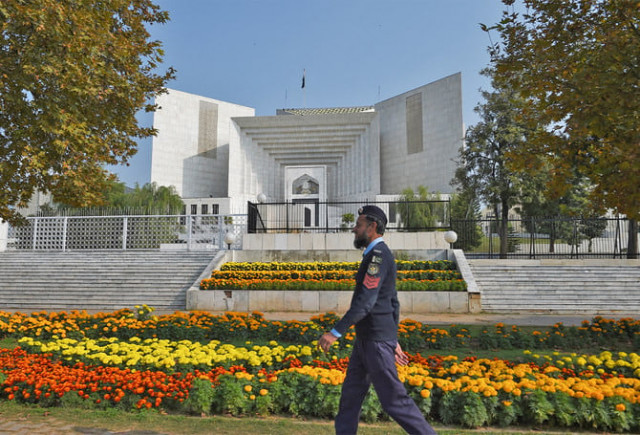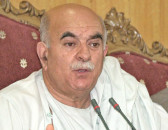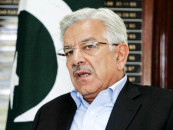Did SC ruling undermine parliament?
PTI lawyers argue court usurped Article 69; legal experts say it held Constitution supreme

The legal debate continued as to whether or not the Supreme Court’s detailed judgment quashing the then National Assembly deputy speaker’s ruling had affected parliament sovereignty.
Chief Justice of Pakistan Umar Ata Bandial while authoring the judgment had interpreted Article 69 of the Constitution.
Article 69 reads that the validity of any proceedings in [Majlis-e-Shoora (Parliament) shall not be called in question on the ground of any irregularity of procedure.
The judgment stated that parliamentary proceedings that infringed the provisions of the Constitution were no longer protected.
"However, we reserve our comments on the effect of an illegality/violation of a law on the protection provided to proceedings in parliament. Indeed the latter scenario does not arise for determination in the present matter,” it added.
PTI senior leader Fawad Chaudhry, who is also an advocate, said the Supreme Court had ended the sovereignty of parliament by usurping Article 69 of the Constitution.
“The Supreme Court has taken over parliamentary functions,” he added.
Fawad further contended that the court could have sent matter to parliament for discussion or voting on the NA deputy speaker’s ruling.
He argued that if the superior courts started judging parliament’s decisions, then the trichotomy of power would be ended. “The ruling of the NA deputy speaker can only be set aside by parliament itself.”
Fawad also maintained that in view of the SC judgment, all political cases would land in the apex court.
“The credibility of the SC is at stake due to its decisions in political cases,” he added. He also reiterated that whenever the PTI returned to power with a two-thirds majority, the SC decision would be overturned by parliament.
Another PTI lawyer Ali Zafar did not object to the reasonings of the main judgment. However, he cautioned that the apex court had still opened the door to review parliamentary decisions on procedural irregularities.
He argued that if the SC went beyond the principle settled in this case, then there would be a clash within institutions. Renowned lawyer Salman Akram Raja disagreed that the judgment undermined parliamentary sovereignty.
Raja claimed that Article 69 only protected the irregularity of procedure. "The language used in Article 69 is a clear departure from the language used in the para materia provision in the 1956 Constitution,” he added.
“No absolute bar to judicial review has been imposed. This was a case in which the deputy speaker, acting as the speaker, had obstructed the working of parliament. The court enabled parliament to function. The idea that the speaker can bring parliamentary functions to a standstill and deprive members of the right to debate and vote is nonsense.”
The lawyer maintained that the judgment had ensured that a speaker did not stifle parliament by becoming a tool in a political scheme. “Parliament's authority has in fact been restored.”
Raja also said that the speaker was not the National Assembly. “If he [speaker] prevents the assembly from functioning, he must be overruled by the courts, particularly when the assembly itself has been disabled from correcting the speaker's wrong actions.”
Former Sindh High Court Bar Association (SHCBA) president Salahuddin Ahmed said overall it was a well-reasoned judgment.
"It does not affect parliamentary sovereignty. The SC has pointed out that Article 69 of the 1973 Constitution only protects any procedural irregularities whereas the previous Constitutions protected all parliamentary proceedings,” he added.
“The speaker’s act of not allowing voting on the no-confidence motion was not a mere procedural irregularity but a clear defiance of the express mandate of Article 95 of the Constitution. As such, it could not be given the protection of Article 69.”
The ex-SHCBA president claimed that the SC verdict emphasised that it was the Constitution that was supreme instead of parliament.
“It also points out that there was no cogent material before the speaker to allow him to reach a conclusion of foreign interference.”
Salahuddin further said the SC had also rightly declined the then attorney general for Pakistan's request to allow fresh elections rather than directing the motion of no-confidence to go ahead.
He observed that this would amount to giving the PTI government a premium on its own illegal act.
"The only objectionable part of the judgment is where SC observed that it cannot lend support to any extra constitutional measure unless a compelling public interest is demonstrated by evidence,” he noted.
“In fact, the SC cannot and must not support extra-constitutional steps under any circumstances - whether under pretext of ‘public interest' or otherwise. The judiciary can only decide matters as per law.
The shifting sands of public opinion and public interest are not in their area of expertise.”
Advocate Mansoor Awan said the Supreme Court had in clearer terms expounded the scope of exclusion that Article 69 envisaged.
"By holding that whatever, whether procedural or substantive, is provided in the Constitution ought to be followed by parliament as well. The court has only stated the obvious. This, in no way, affects parliamentary sovereignty, in my opinion,” he added.
He believed that it buttressed the cardinal principle that all state institutions including, parliament, were bound to follow the Constitution. “We should bear in mind that Article 95 was trampled upon by the [then] deputy speaker thus, preventing the only democratic process to vote out a prime minister.
Had this act been countenanced, it would literally have rendered Article 95 redundant. Such unconstitutional acts must be nipped in the bud, which is exactly what the Supreme Court has done.”
Barrister Asad Rahim Khan said of the various Supreme Court verdicts pertaining to dissolution of the National Assembly, this one was among the clearest to understand, and rebutted the Junejo-era judgment by holding, with zero ambiguity, that a parliament unlawfully dissolved must be restored.
“This marks only the second time this has happened in the life of our democracy, despite 10 dissolutions: it will be remembered as a judgment that honoured the Constitution,” he added.
"The court has also rightly clarified that our current constitutional scheme allows it to rule on parliamentary proceedings where substantive violations have taken place. There can be no doubt that [then NA deputy speaker] Mr [Qasim] Suri’s act was a plain violation.
The criticism that this judgment infringes upon parliamentary sovereignty holds no weight. Rather, it affirms the fundamental right of citizens to be governed by a majority of their elected representatives.”
He argued that a majority was best secured by a general election, than a sham coalition that intrigued its way into power in the middle of a term, through shadowy forces.
“The sole discordant note lies in the concurrence, which mentions charges as grave as treason in a strangely ambiguous non-direction. It would have been better instead to have followed the majority judgment’s reasoning: it is coherent, comprehensive, and much needed.”
A senior PTI lawyer admitted that the NA deputy speaker’s “wrong” ruling had compelled the court to intervene into the matter.
Senior lawyers believe that the speaker should not resort to any unconstitutional or undemocratic act; otherwise courts would be compelled to intervene into the matter.



















COMMENTS
Comments are moderated and generally will be posted if they are on-topic and not abusive.
For more information, please see our Comments FAQ